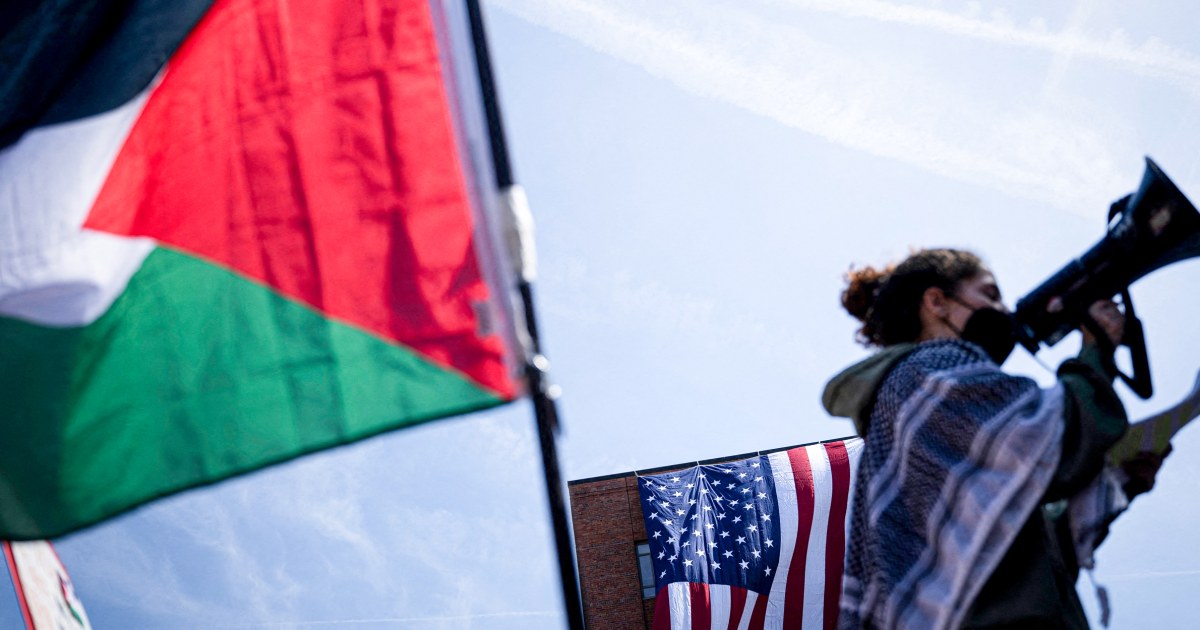
CHICAGO — The U.S. Secret Service has led security planning for nearly a year. Chicago police have spent hundreds of hours training officers to responsibly handle protesters. Public officials are vowing to strike a balance between keeping order and allowing free speech.
Yet tensions remain high over the prospect of a Democratic National Convention in Chicago this August.
The rash of protests at college campuses across the nation over the Israel-Hamas war, including violent clashes at UCLA and most notably, a building takeover by protesters at Columbia University in New York City, has added a new urgency over security and whether protests could spiral out of control this summer. The focus comes as the city expects more than 5,000 delegates to descend on the DNC, with tens of thousands of additional visitors, including from the highest levels of government, from the president on down.
Groups vary in their expectations for how many activists will travel to the city, with the ACLU putting it in the thousands and one pro-Palestianian group putting it at the tens of thousands.
Those involved with security and logistics planning — including the Secret Service, the Chicago Police Department and those directly involved with the convention arena itself — insist there will be a balance between allowing freedom of speech and keeping order. They also say they’re ready for what’s to come, and while they’re paying close attention to the kinds of protests that have broken out on college campuses, they are not scrambling security plans because of them.
“Individuals can expect to see a very heavy presence of uniformed officers to ensure the highest level of safety for residents, business owners and attendees,” said U.S. Secret Service spokesman Anthony Guglielmi.
Illinois Gov. J.B. Pritzker said he felt confident about the city and state’s ability to hold a peaceful convention.
“There are always protests at conventions. I have been to almost every convention since I was able to vote. I have seen protests at every single one of them on a variety of issues,” Pritzker said in an interview. “I don’t think any better or worse this coming summer. I do think, though, that even though there will be protests, the security plan for Chicago, and the experience that people who are coming here for the convention will have, will be an outstanding one just like it was in 1996.”
Meantime, a slew of activist groups are challenging security plans in court, saying the location where they are now allowed to march — more than 3 miles away from the convention facility — violates their First Amendment rights, and they should be within “sight and sound” of the United Center.
“This is politics at play. I think there’s a lot of pressure from the DNC not to put President Biden in a position to be within sight and sound of protesters,” said Christopher Williams, an attorney representing a coalition of groups whose protest permits have so far been denied and are asking the city to move protests closer to the United Center. “You see that in the way that his campaign is handling events now, that they don’t want to see any protests in the backdrop of President Biden.”
Guglielmi, who himself spent years working with the Chicago Police Department, noted that federal authorities have offered more than 400 hours of training to Chicago officers on a combination of handling civil disturbances and protecting free-expression rights.
National political conventions are designated as National Special Security Events, which require the highest levels of security and allow officials to extend their reach, if necessary, into other federal agencies. Dozens of other agencies are already involved in security planning: the Cook County Sheriff’s Police, the Illinois National Guard and the Illinois Emergency Management Agency are a few examples.
“This is not just on the city of Chicago’s shoulders,” Guglielmi said. “You’ve got immense help from every federal agency that you can think of that we would want to engage.”
“I’m uniquely positioned here just because I was the chief spokesman [for the Chicago Police Department],” he added. “They are incredible partners. I know they’re very prepared, and they already even have plans should there be a dispersal during a demonstration.”
That includes training officers to protect the media’s role and “safeguard the freedom of the press during these things,” he said.
Activists and free speech advocates, though, have a decidedly different view. Deep concerns still exist over exactly what the security perimeter — the fenced-off area where only those with credentials can enter — will ultimately look like and whether protesters will be allowed to get close enough to the event. And they’ve vowed that if they are not given a permit, they will march anyway.
“We clearly do not have a plan in Chicago for accommodating free expression during the course of the DNC,” Ed Yohnka, director of public policy and communications at ACLU Illinois, said in an interview. “It raises a number of troubling factors in terms of how ultimately people will respond.”
Faayani Aboma Mijana, whose Chicago Alliance Against Racist and Political Repression is among the 70 organizations that are part of the Coalition to March on the DNC, said he is expecting tens of thousands of protesters in the city. Even if there is a cease-fire by August, the protests will not stop until there is a free state of Palestine, he said, and the United States stops funding Israel. But he said they have every intention for their activism to be peaceful.
“My fear is around whether or not the police officers and federal agents don’t infringe on our right to assemble and protest,” he said. “We’re aiming to have a family-friendly protest that families can come to.”
The Secret Service said the exact perimeter has not yet been set. It is still being worked out and a door-to-door canvass of residents in and around the United Center is underway to make sure security checkpoints are the least disruptive possible.
Williams, the attorney representing the coalition, acknowledged that city officials reached out to him after he filed a motion for an injunction this week, asking to discuss alternative routes for marches.
Williams said he also has some trust in Chicago Mayor Brandon Johnson, a longtime progressive organizer who broke a tie vote in the Chicago City Council to pass a resolution calling for a cease-fire in Gaza: “I’m inclined to give this mayor the benefit of the doubt.”
Johnson has repeatedly said he would work to strike a balance between the rights of protesters and not allowing events to devolve into chaos.
A Democratic National Convention official close to logistics planning told NBC News in an interview that they felt “absolutely” assured about the safety and security of the convention and delegations.
“I feel comfortable and I’m confident that we’re going to have a great convention,” the person said.
The logistics planner described intricate, long-term planning over how to safely move delegates from hotels and events to the convention center.
One Democratic strategist familiar with the planning described concerns tied to recent protests as “overblown.”
“Staff is making necessary plans and going through every scenario to make sure they’re prepared. There is no question there are a lot of protests at the president’s events, so they are concerned and want to make sure they’ve got mitigation tactics in place,” the person said. “The concern over the protests is not driving the daily process.”
That person did say there has been talk of convening a team to “remove protests at the private events the president is doing,” and noted that this is an existing protocol.
Reasons for a deeper distrust between activists and authorities are as complicated as Chicago itself, including decades of fraught relations between police and the community, layered over by present-day crime challenges in a city that’s still struggling to shed the stain left by a violent Vietnam War-era Democratic National Convention in 1968.
But one doesn’t have to look back that far for comparisons. During the George Floyd protests, the city struggled with its response to ward off crowds and took the controversial move of raising the bridges in Chicago’s Loop to keep people away.
Less often noted, however, is Chicago’s peaceful convention of 1996, where the most memorable moments were not around police pelting protesters but cringey “Macarena” dancing. A 2012 NATO summit saw large-scale demonstrations and days of protests. While there were some clashes with law enforcement, police largely showed restraint.
While the specter of the 1968 convention still hovers over Chicago, planners call it alarmist thinking.
One historian who was present at the 1968 convention in Chicago called it a “lazy” comparison. Sean Wilentz, a historian and professor at Princeton University, said — while not minimizing today’s conflict — the political climate in the Vietnam War era was incomparable. Thousands of Americans were drafted to fight in the war and were dying. Martin Luther King Jr. had been assassinated that year, as well as Bobby Kennedy.
“The divisions inside the Democratic Party were so profound, much more profound than they are today. … It’s in a wholly different political historical context,” Wilentz said. “I mean, Dan Rather was getting the death kicked out of them by some detective. There were journalists being assaulted on the floor, OK?”
But there’s also a deep-seated distrust between the community and the Chicago police that the department has been trying to shed for decades. Beyond the 1968 convention, where police officers openly clubbed protesters, former police commander Jon Burge strained race relations for a generation after he and his so called “midnight crew” routinely tortured Black suspects into confessing to crimes. It wasn’t until 2008 that Burge was charged in federal court. In 2014, the killing of LaQuan McDonald was another inflection point. A white police officer fired 16 shots at McDonald, who was holding a knife.
Chicago Police Superintendent Larry Snelling this week noted that the college protests in Chicago have so far been peaceful.
“If people are just trying to have their voices heard, hey, this is America, it’s their choice. And it’s our responsibility to protect them while they do it,” he said at a recent forum.
Snelling addressed preparations for the DNC this summer, saying that Chicago police officers are getting multiple hours of training on the First and Fourth amendments. “It’s embedded in every aspect of their training,” he said. “Crime is something we’re not going to tolerate. Because the minute we start tolerating that everything else breaks down and then it’s no longer peaceful protesting, it turns into a riot.”
Activists, however, remain skeptical.
“We don’t see the superintendent as a friend of ours,” said Aboma Mijana, who also does work involving police crimes. “He’s opposed to what we do.”
Source: | This article originally belongs to Nbcnews.com










